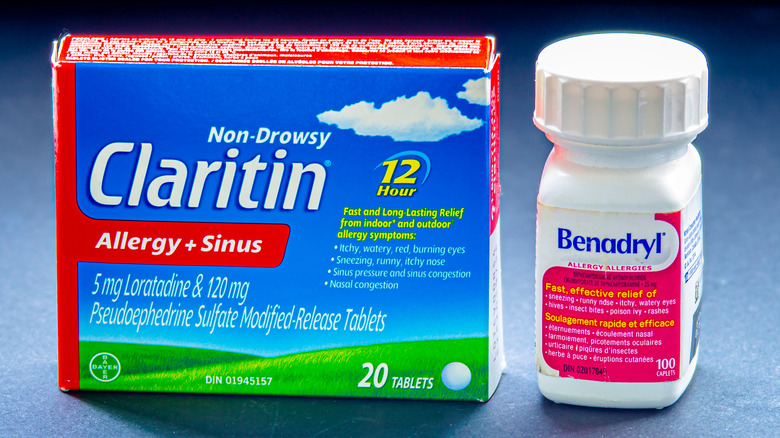Does Allergy Medicine Expire?
Allergy medicine can be a big help to those who have year-round or seasonal allergies. Whether you're allergic to pets or pollen, allergy medication, or antihistamines, can help reduce and relieve unpleasant allergy symptoms, like sneezing, itchy and watery eyes, runny nose, congestion, and headaches (via Verywell Family). They work by blocking your body's histamine response, which can help keep your allergy symptoms under control.
Just as there is a wide range of allergies, however, there is also a variety of different types of allergy medication, including pills, nasal spray, eye drops, and liquids. Some of these methods have age restrictions or can cause drowsiness, but for the most part, they can all offer relief. That being said, it's important to be mindful of exactly how long you've had a bottle of pills or nasal spray laying around the house before you use it. The expiration dates are indicative of a medicine's effectiveness.
Allergy medicine can last beyond the expiration date
Like most prescription and over-the-counter medications, antihistamines have an expiration date. That's because all allergy medications are regulated by the U.S. Food and Drug Administration (FDA), which requires manufacturers to include expirations dates based on how long a medication's active ingredients remain potent before they become ineffective. According to Insider, over-the-counter allergy medications, like Claritin, usually have a shelf life of 2.5 years, while prescription antihistamines typically expire after 1 year.
Expiration dates for nasal sprays and liquid medications tend to range between 1 and 2 years. However, this doesn't necessarily mean that you can no longer use them beyond this point. As it turns out, allergy pills can still be effective 2 to 3 years past their expiration date, while nasal sprays can retain their effectiveness up to a year after the bottle's expiration date. Using them beyond this time frame, however, will likely prove to be ineffective.


